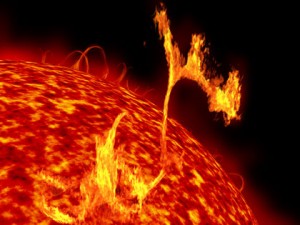Science Seen Physicist and Time One author Colin Gillespie helps you understand your world.
The Laws of Physics Are Not Sacrosanct
We like to think of laws of physics as fundamental, as properties of the universe. Actually, not. They are our inventions, tales we tell ourselves in terms of concepts we construct. They are good statistical approximations. But they don’t tell us what’s really going on.
The real world is happening at Planck scale, named for Max Planck who found the fundamentals of quantum theory in 1899. He showed that Planck-scale is far faster and far smaller than we can ever see. So what’s the use of thinking about it? Actually, lots.
While the laws of physics can be useful, treating them as true inhibits understanding. For example, physicists are taught that Conservation of  Mass-Energy is a fundamental law. But is it? At ordinary scales and for ordinary times it is a very good approximation. Even in the seeming extremes of our Sun’s nuclear furnace it works well. But if we think very big (or very small) it can be completely wrong.
Mass-Energy is a fundamental law. But is it? At ordinary scales and for ordinary times it is a very good approximation. Even in the seeming extremes of our Sun’s nuclear furnace it works well. But if we think very big (or very small) it can be completely wrong.
As readers of last week’s post will know, our best assumption is the universe began with just a single quantum of space some 13.8 billion years ago. This original universe contained no mass or energy. As space quanta replicated, tangles in the links between them created what we see as particles of energy and matter. A universe-worth of matter and energy burst into existence in a very short time. Of course a physicist might well dismiss this concept out of hand without realizing that conservation of mass-energy has no place in the physics of the very early universe.
Gross violations of the Law of Conservation of Mass-Energy are not confined to ancient cosmologic history. At Planck scale, space quanta continue to replicate, though slowly. At large scale, the effects of vast numbers of these events continue to defy the Law. Almost ninety years ago Belgian physicist Georges Lemaître used the new equations of general relativity to predict that space should be expanding. Today we have measurements that confirm it is and tell us how fast. (It sounds slow; a given volume of space increases by some 0.02% per million years.) Other measurements tell us the mass density of space (not the matter in it: just the space has a mass of more than eight-billion-billion tons per cubic light-year). It is easy to calculate that, in the universe that we can see, about 1034 tons or a trillion Earths-worth of new mass comes into existence every second.
Or does it? Is it possible (as I’ve speculated elsewhere) that something is converting old mass into new space? Actually, I think not, but such questions can’t be meaningfully asked let alone answered if one assumes that the Law of Conservation of Mass-Energy is valid at cosmological scale or at Planck scale. The evidence we have so far suggests that it may be wrong at both scales.
Physics gives us ways to predict things. But it does not, so far, offer us a way to understand our world. That is okay; its role has never been to provide understanding. But when we take it too seriously—when we begin to believe—its precepts get in the way of original thought. As Albert Einstein warned: ‘Concepts that have proven useful in ordering things, can easily attain an authority over us such that we forget their worldly origin and take them as immutably given. … Such errors make the road of scientific progress often impassable for long times.’
As we seek to understand our world at Planck-scale with our minds still mired in concepts from a century of atom-scale physics, this warning seems more pertinent than Einstein could ever have imagined.
Sources:
Albert Einstein (1916), “Ernst Mach”, Phys. Zeitschr., vol. 17, p. 101; transl. Alfred Engel (1977), The Collected Papers of Albert Einstein, Princeton: Princeton University Press, vol. 6, p. 142; http://einsteinpapers.press.princeton.edu/vol6-trans/154
Image credit: Paul Fleet, http://www.scienceclarified.com/Ci-Co/Conservation-Laws.html

No comments yet.